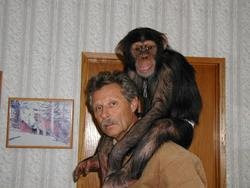A broad subject. We will start with totally random things.
1) Career Builder's use of monkeys:

So career builder created an ad campaign that had to do with monkeys some time back. In case you don't remember, here is a link to a boardroom full of monkeys dressed in rather elegant suits, a table covered with bananas, and a disturbed regular white-collar worker. A little weirder, and as part of some sort of "alernative" viral marketing campaign, they offered up the monk-e-mail, an e-mail, the content of which contained a monkey. An example is offered here (courtesy of this site).
Okay, so this is just kind of weird and honestly, a general problem with using animals for commercial purposes. Not only is career builder relying on stereotypes to characterize monkeys but it is also using them for commercial gain, none of which goes to the monkeys. Actually, I don't know that. But I'm willing to guess that these monkeys didn't receive trusts as a result of their work. I'm actually not kidding on that point. I do kind of have an issue with this, just based on the general view that you should gain based on your work, so although perhaps the trainers etc. should receive some recompense, clearly the monkeys should as well. No really, I mean it.
2) Insane people concerned with monkeys in the media:

Um, right. So some character named "Mr. Monkey" rather unironically made a list of famous monkeys. It is full of great information, like that Howard Stern had a monkey on his show - except of course that Baba Booey is not a monkey but a nickname for a person, so it really only vaguely has to do with monkeys.

Someone I had almost forgotten about - Elijah, the pet chimp in Being John Malkovich. I've seen the movie several hundred times but didn't think of him, I suppose because he actually is so human in the movie. And is really given more attention than some of the characters by Cameron Diaz (in one of her great roles). Theoretically at least, he is really treated as a human, being given childhood psychological trauma, just like everyone else who grew up when he did.
3) Monkeys and Reality:
Now here is a thought: wikipedia has an entry titled "List of Fictional Apes." Query whether it really makes sense to call real monkeys in movies "fictional" because they are playing characters - like if you're playing a character and you don't know it, are you really fictional? I'm not at all sure. It's rather Truman Show-esque --> so if I'm living my life and don't know that I'm a character in a film, am I really a character or am I myself? I think I'm just myself.
4) Actual documentation of my babbling:

Evidently, chimps acting are doing so in a state of terror: "In order to force them to perform, trainers often beat young chimpanzees with their fists, clubs, or even broom handles. Shock devices may also be used. This systematic pattern of abuse and dominance causes the animals to be constantly anxious and fearful, always anticipating the next blow."
Yikes. And it goes on:
"Apes are routin
 ely beaten into submission and forced to pantomime human behaviors that are foreign and confusing. The public learns nothing about a chimpanzee or orangutan by watching him or her riding a skateboard or dancing in a tutu. In fact, it is misleading to portray these animals as cute, cuddly, childlike creatures, and doing so encourages people to acquire these intelligent, strong, and often dangerous animals as 'pets.'"
ely beaten into submission and forced to pantomime human behaviors that are foreign and confusing. The public learns nothing about a chimpanzee or orangutan by watching him or her riding a skateboard or dancing in a tutu. In fact, it is misleading to portray these animals as cute, cuddly, childlike creatures, and doing so encourages people to acquire these intelligent, strong, and often dangerous animals as 'pets.'"Fair point. Chimps are not particularly good pets, nor are they human. And, dear god, Jane Goodall is in support of what I'm saying, so clearly it's correct.

But really, the problem is the same as with anything - you can forget that people are horrible until you are faced with the fact that they treat animals horrifically. I wouldn't normally cite PETA as a source, but this handout makes a rather compelling case. "Steve Martin's Working Wildlife" is a fascinating example (NB that no, not the steve martin you're thinking of).
Wow. Does this guy look creepy, or what? It really isn't surprising that he disposed of an unwanted chimp in an inappropriate manner.
In any case, this diatribe could go on indefinitely. Point being, there is something to be said for not using actual animals in commerical media. Particularly monkeys. For some reason, it looks especially exploitative.






